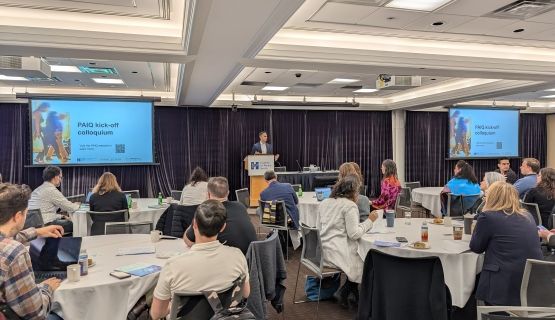Trusted research, with reach and impact
The Institute for Work & Health (IWH) is an independent, multidisciplinary, not-for-profit research organization located in Ontario, Canada. IWH conducts and mobilizes research that supports policy-makers, employers and workers in creating healthy, safe and inclusive work environments.
Latest news & findings

Lower injury rates found when workers feel their workplace prioritizes their wellbeing
Workers who feel their workplaces are not committed to their mental wellbeing have more than twice the risk of work-related physical or mental health injuries compared to workers who feel the opposite. That’s according to an IWH study that asked workers about the psychosocial safety of their workplace—that is, whether an organization prioritizes mental health and wellbeing, and takes action to prevent psychosocial hazards. The study found that poor psychosocial safety and poor physical safety both increase the risk of work-related mental and physical injuries.

What work and health challenges might OHS professionals face by 2040?
What challenges may face occupational health and safety (OHS) practitioners and policy-makers in the next 15 years? An IWH team recruited OHS practitioners from across Canada and Europe to help answer this question. The resulting strategic foresight report offers seven future scenarios that may face OHS by 2040. It also lays out important questions about each scenario that OHS may need to confront in the years to come.

IWH Speaker Series: Using cannabis to manage symptoms of work-related injuries—Experiences of injured workers in Ontario
On February 24, Dr. Nancy Carnide shares findings from interviews with workers who have sustained a work-related injury. She discusses their decisions to use cannabis, their perceptions of its impacts, and their experiences using cannabis while returning to work.

AI and job quality project gathers partners to develop roadmap
Job quality is increasingly recognized as an important factor for workers’ health, safety and wellbeing. As artificial intelligence (AI) becomes more integrated into workplaces, how can we ensure that job quality—and the health and safety of workers—remains a top priority? That’s the question the newly launched Partnership on AI and Quality of work (PAIQ) project wants to answer. The team recently came together to kick off the next seven years of work and to discuss the top-of-mind research questions for stakeholders.
IWH Speaker Series
Learn directly from IWH researchers themselves about their latest findings in health, safety and disability prevention. The IWH Speaker Series is a livestream webinar series that features new study findings from the Institute for Work & Health. The webinars are usually held once a month, on a Tuesday at 11:00 a.m. EST. Recordings are also available to watch on demand.
Explore the site
Tools and guides
Integrate evidence-based policies and practices into your occupational health and safety, return-to-work and rehabilitation programs. IWH has created a number of tools and guides based on our research findings that can help improve program outcomes.
Impact case studies
Find out how IWH research is making a difference. Read our impact case studies, in which policy-makers, workplaces and other stakeholders in health, safety and disability prevention tell how IWH research helped improve their policies, programs and practices.
Research summaries
Whether it’s a policy briefing, a systematic review summary or the highlights of a specific research project, we’ve compiled a number of plain-language summaries to help you understand the research we’re doing, what we have found, and how we found it.